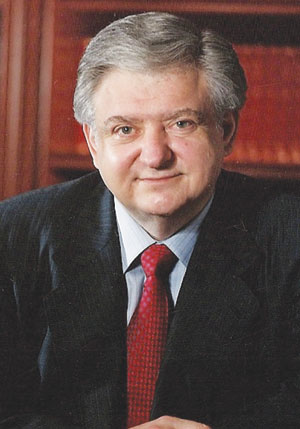The appeal factum filed on behalf of Toronto lawyer Joe Groia, convicted of professional misconduct and accused of “abuse of process” for defending himself by a Law Society of Upper Canada disciplinary panel, alleges that some of the ruling’s conclusions themselves amount to such an abuse.

More particularly, the panel concluded Groia’s attempt to defend himself on the disciplinary charges was an abusive attempt to relitigate findings already made by the court. The factum calls that conclusion a “remarkable” one that amounts to an “abuse of process.”
However that may be, there’s some irony in the strong language used by Groia’s lawyers, Earl Cherniak and Jasmine Akbarali of Lerners LLP’s Toronto office, in describing the actions of the quasi-judicial panel given that his conviction turned on his allegedly uncivil conduct in court.
Following the June 2012 ruling, the LSUC suspended Groia for two months and ordered him to pay $250,000 in costs.
It found he had been uncivil in his successful defence of John Felderhof in connection to the collapse of Bre-X Minerals Ltd., the company at the centre of the largest mining fraud in Canadian history. Groia appealed to the law society appeal panel and Lerners filed its appellant’s factum on July 24, 2013.
The factum pulls no punches in its criticism of the substantive failings of the decision of the panel that convicted Groia. It alleges, among other things, that the panel “failed utterly to grapple with the tension between incivility and vigorous advocacy and the impact that this has on the independence of the bar.”
But Stan Fisher, a resident arbitrator at Toronto’s Arbitration Place who spent five decades as a commercial litigator in Ontario, believes that the key issue for the appeal panel and any courts that hear subsequent appeals will be one of due process as the hearing panel relied on adverse comments made by the Superior Court and the Divisional Court about Groia “as evidence of misconduct” in the disciplinary proceedings.
Fisher is intimately familiar with the case, having been co-counsel in the R. v. Felderhof matter before the Ontario Court of Appeal, a witness at Groia’s hearing on the role those proceedings should play in the disciplinary hearing, and a “good friend” to Groia.
“The panel treated the obiter comments of Justice [Marc] Rosenberg in the Court of Appeal as somehow or other akin to issue estopped, and that can’t be right,” says Fisher.
In their factum, Cherniak and Akbarali say that treating the reasons as evidence of misconduct “was a clear abdication of the panel’s duty to the profession to independently review and assess the evidence before it.” Doing so, Groia’s lawyers allege, was also contrary to the law society’s own Rules of Practice and Procedure.
The impugned reasons came in the context of proceedings brought by the Ontario Securities Commission to have the trial judge, Peter Hryn of the Ontario Court of Justice, removed from the case because of unfavourable evidentiary rulings and what the OSC claimed was Hryn’s failure to restrain Groia’s conduct.
Justice Archie Campbell of the Ontario Superior Court dismissed the OSC’s application. He was critical of Groia for, among other things, his “excessive rhetoric” but he also confirmed Groia’s right to make allegations of prosecutorial misconduct.
Campbell further observed that there had been “no monopoly over incivility and rhetorical excess” and followed with several examples related to the conduct of OSC prosecutor Jay Naster, who now acts as a defence lawyer with Toronto’s Rosen Naster LLP.
Campbell, however, was careful to put his observations in context.
“Mr. Groia’s unrestrained attacks on Mr. Naster’s
integrity have provoked from Mr. Naster a sometimes excessive negative response,” Campbell observed.
“An atmosphere of mutual distrust between counsel pervades the trial. No opportunity is lost to bicker and squabble. No opportunity is lost to repeat, at great length, arguments and positions cherished stubbornly by each side.
The heated disagreements go well beyond disputed issues of fact and law. Counsel cannot even agree on the preliminary order in which evidence should be led in order to provide a proper foundation for the reception of later evidence.”
In Fisher’s view, Campbell got it right.
“Campbell felt there was enough fault to go around,” he says.
“These guys were battling it out.”
The OSC appealed to the Court of Appeal, which dismissed the appeal. Rosenberg, however, was also critical of Groia’s conduct but noted Hryn hadn’t attempted to restrain him, as he was entitled to do.
For his part, however, Rosenberg also recognized the difficult context in which Groia’s conduct occurred. “This was a complex case involving experienced counsel who took very different views about the role of the prosecutor and the rules of evidence,” he wrote.
It’s a situation many counsel have encountered and it’s probably why Groia has so many prominent supporters among the bar.
“It’s certainly my hope that Joe is successful at the end of the day,” says renowned criminal lawyer Edward Greenspan of Toronto’s Greenspan Partners LLP.
Whatever the outcome, Fisher hopes the appeal panel is mindful of the far-reaching potential of the case.
“It’s very important that the panel bear in mind the policy effect of this decision on the role of barristers in any hard-fought criminal or civil proceedings,” he says.
For more, see "
Groia defends 'forceful advocacy.'"

 More particularly, the panel concluded Groia’s attempt to defend himself on the disciplinary charges was an abusive attempt to relitigate findings already made by the court. The factum calls that conclusion a “remarkable” one that amounts to an “abuse of process.”
More particularly, the panel concluded Groia’s attempt to defend himself on the disciplinary charges was an abusive attempt to relitigate findings already made by the court. The factum calls that conclusion a “remarkable” one that amounts to an “abuse of process.”